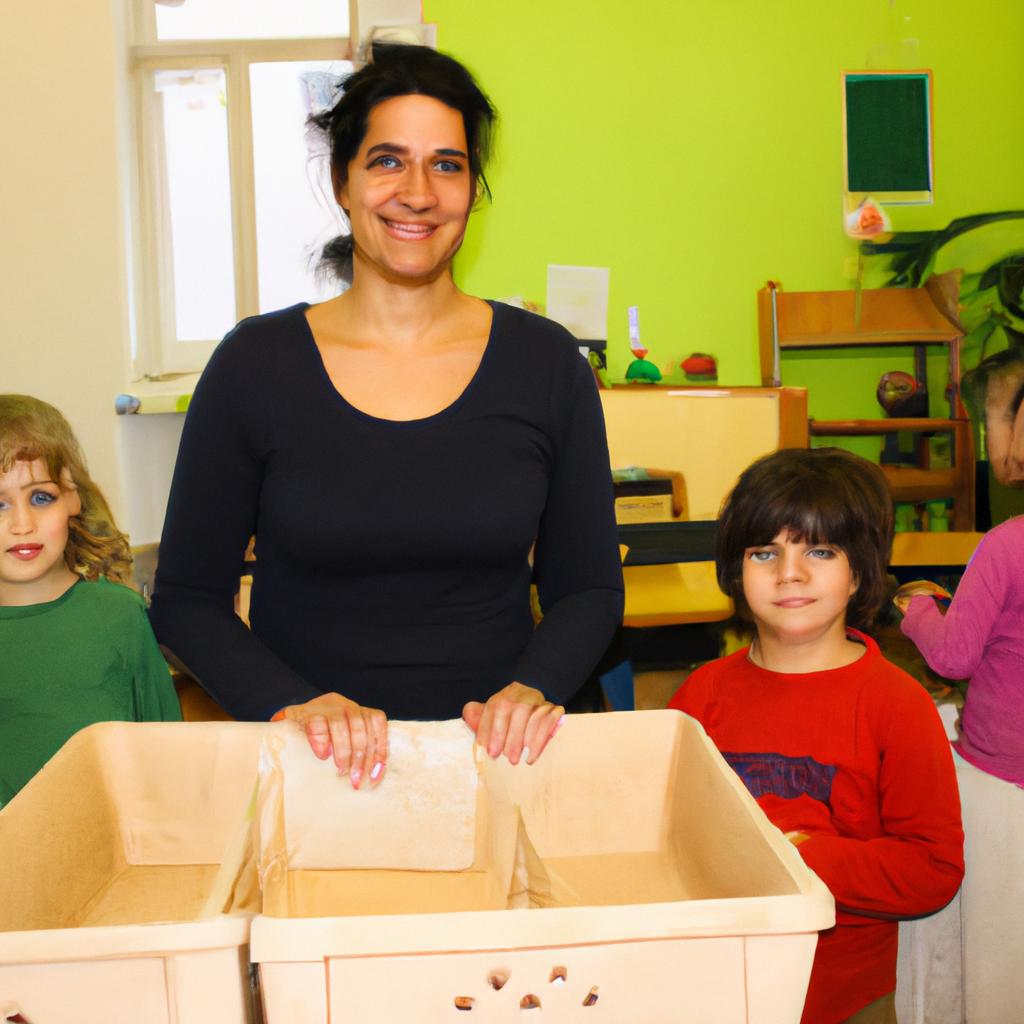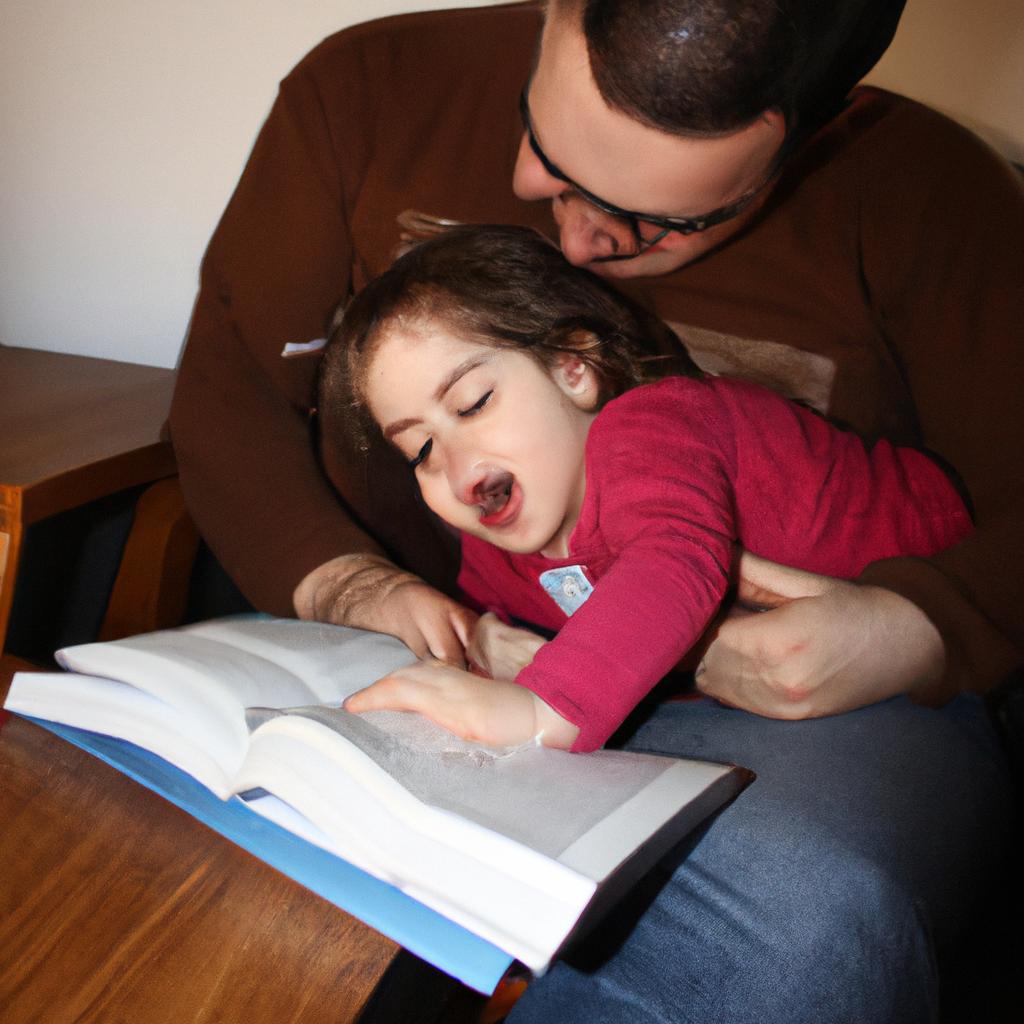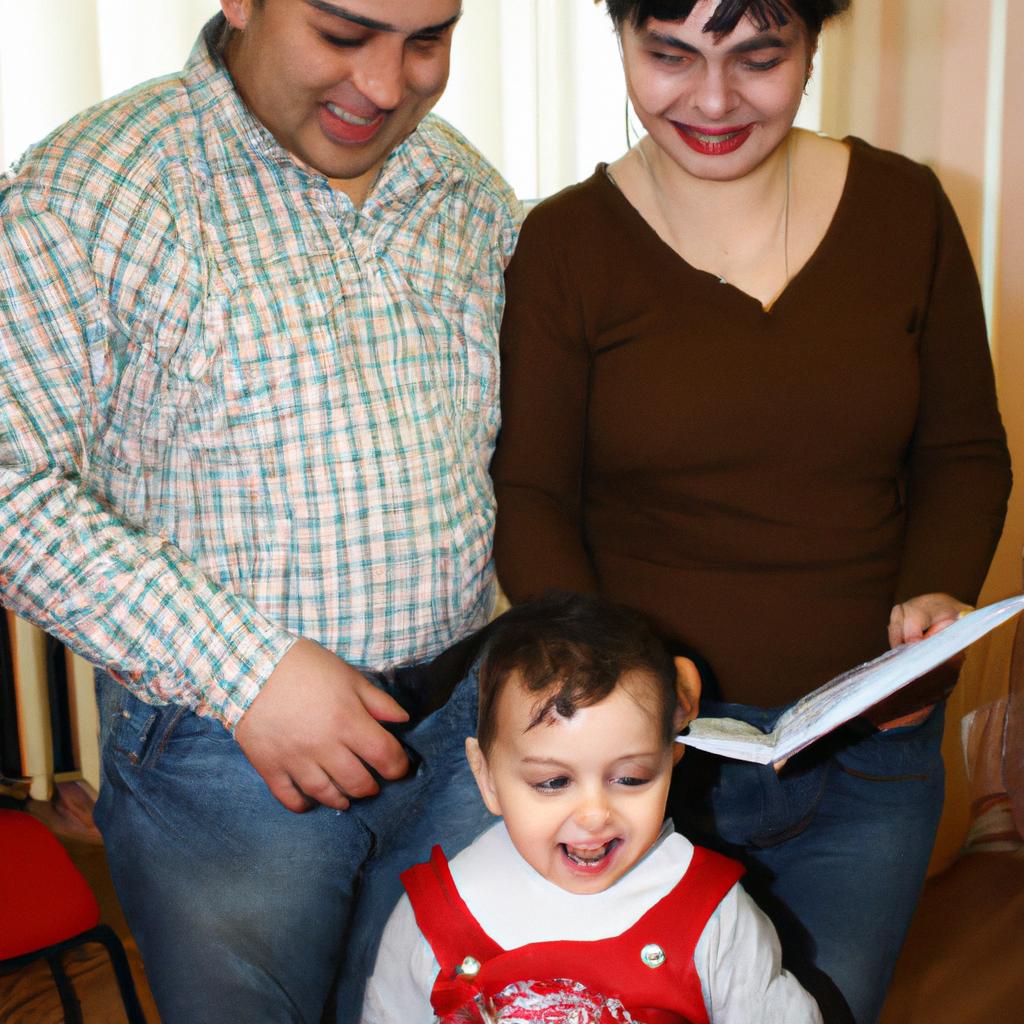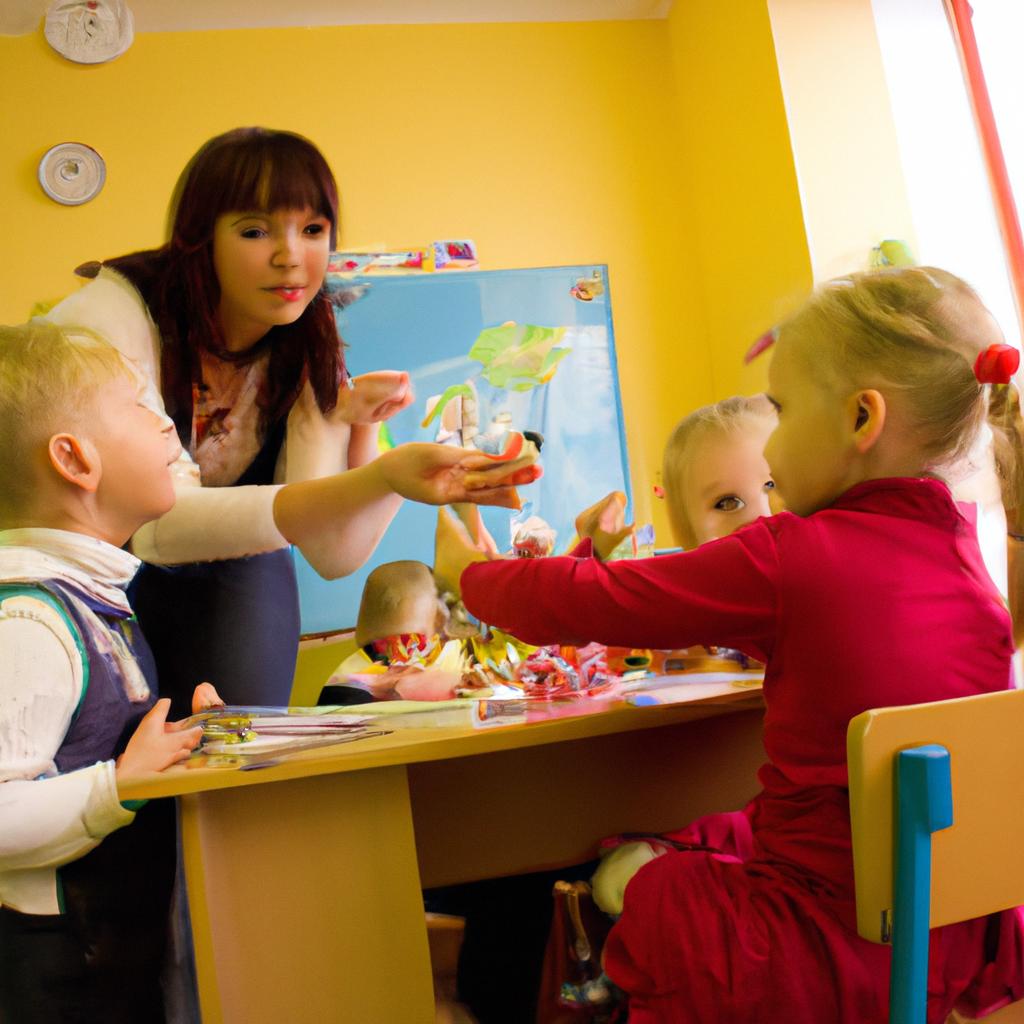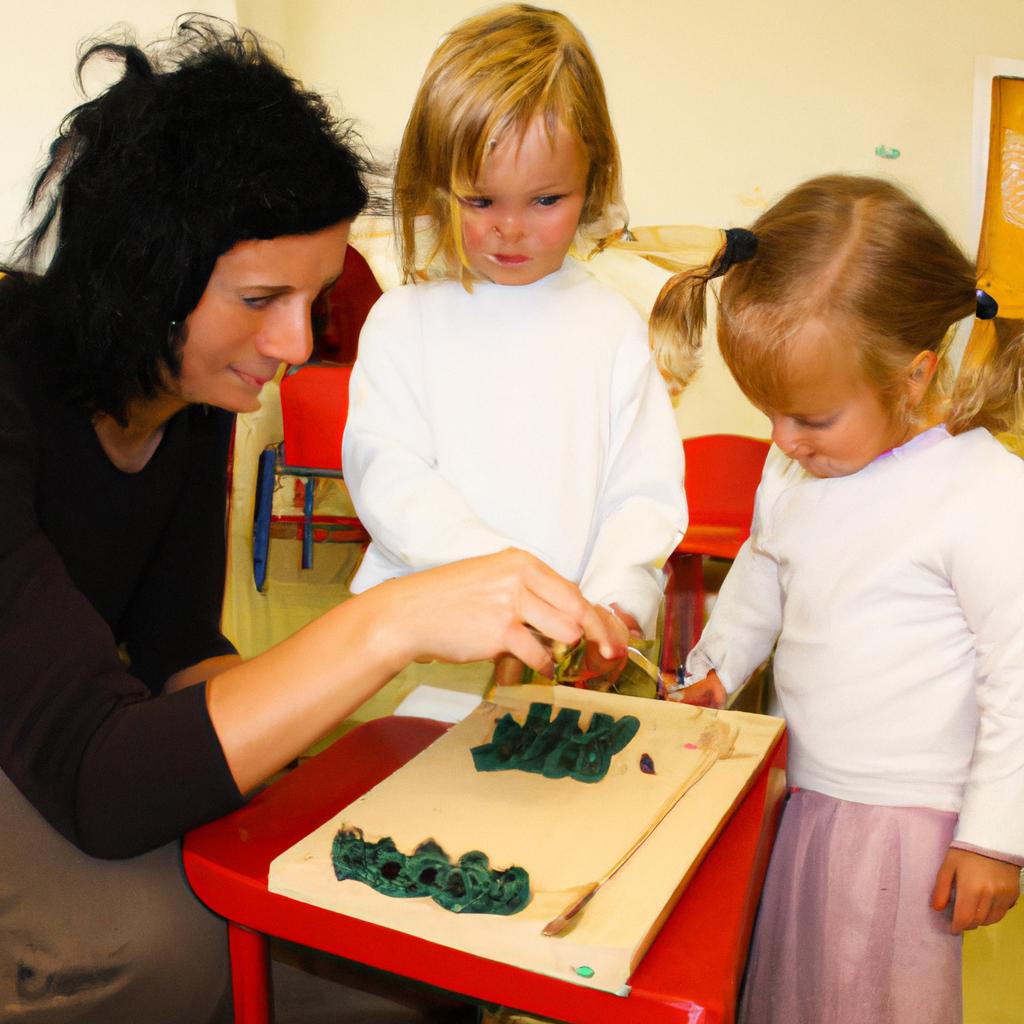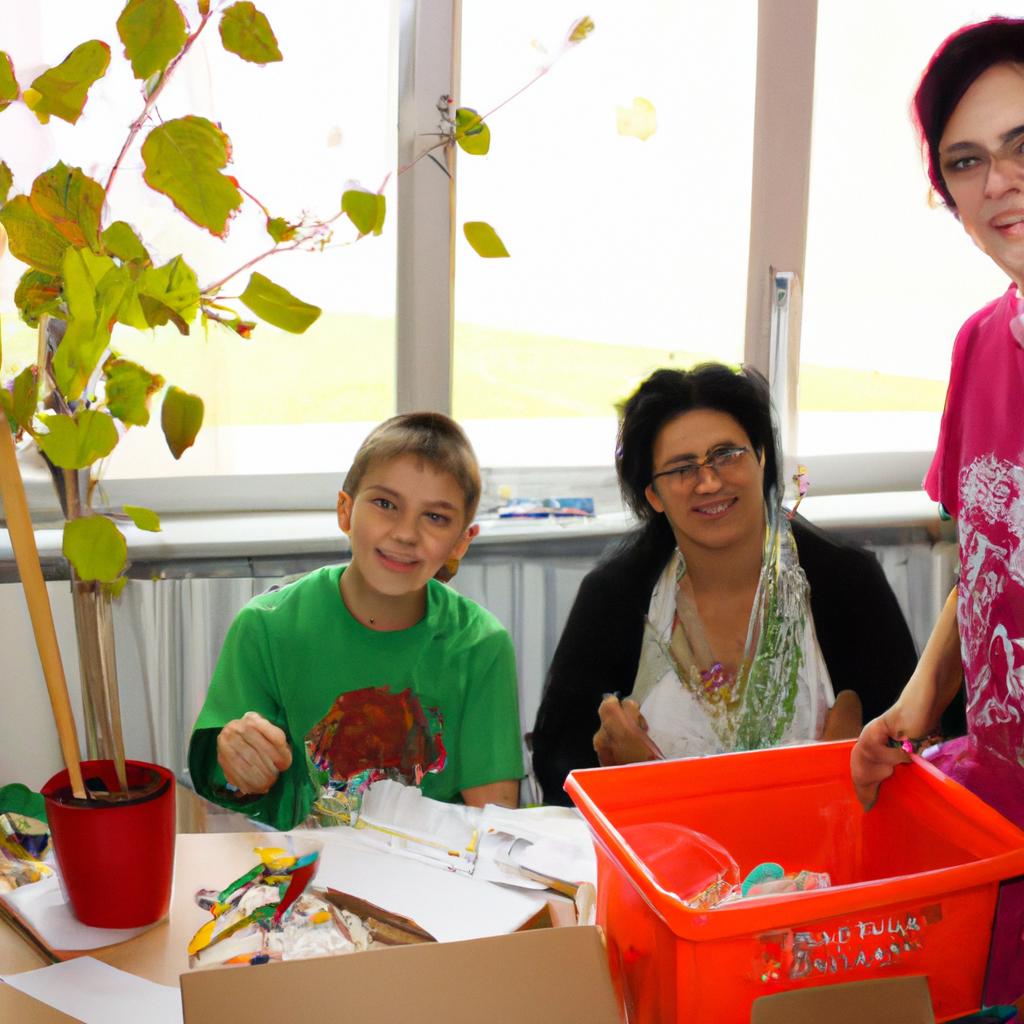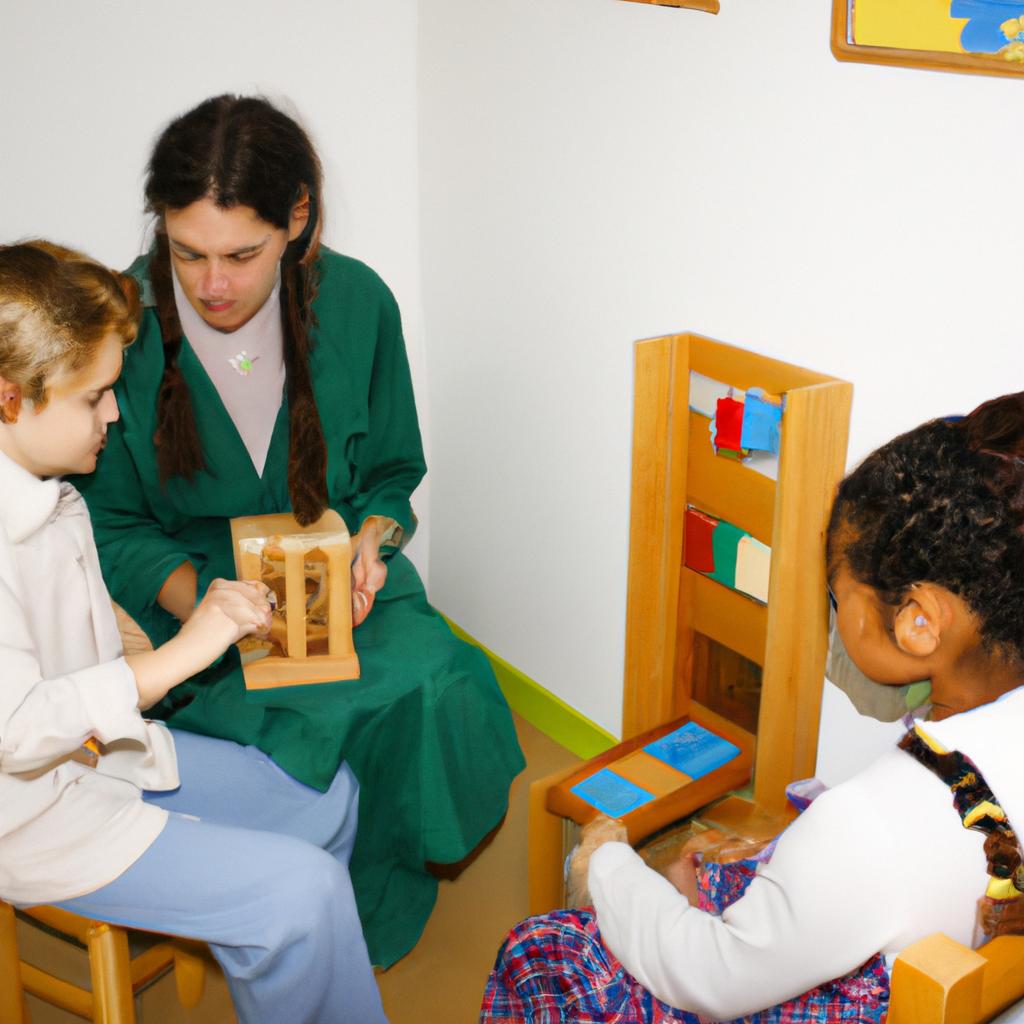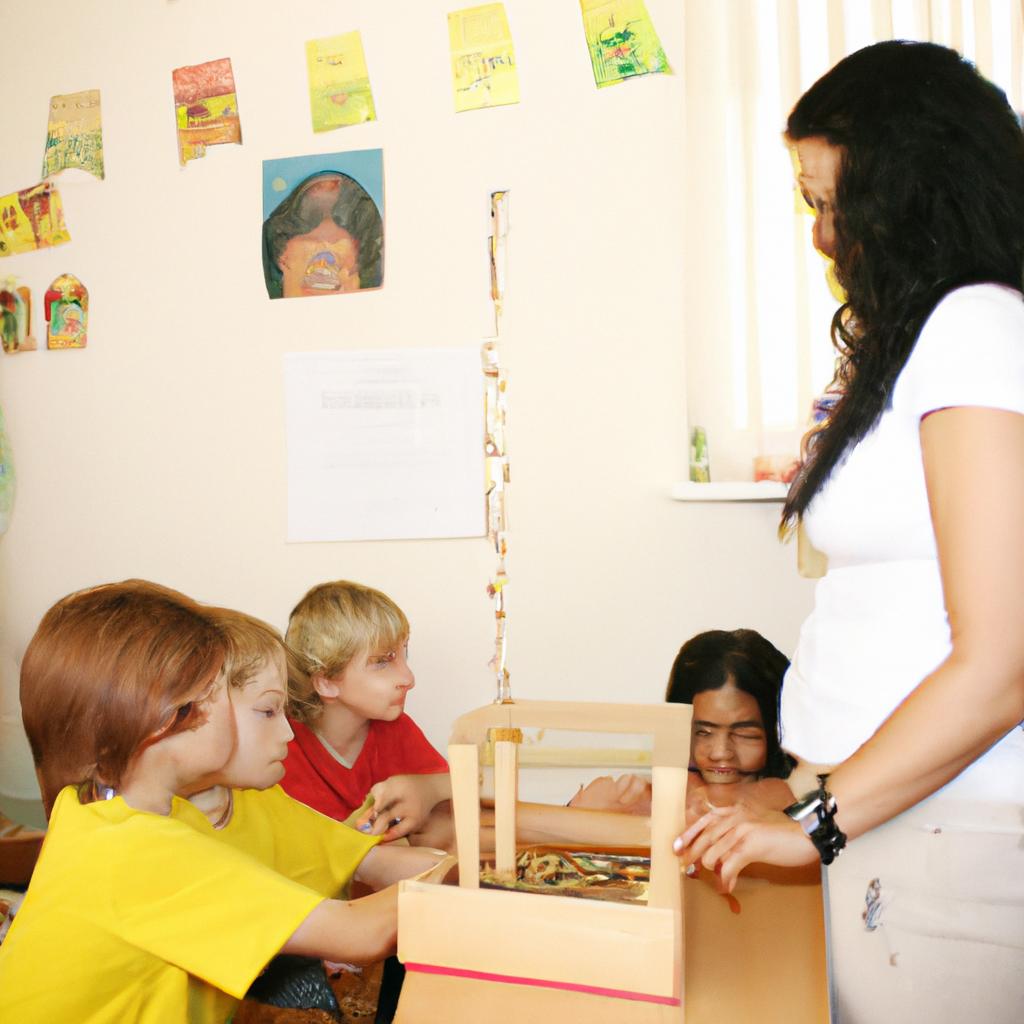Parent involvement in Montessori education plays a crucial role in enhancing engagement and overall success at the Montessori school. For instance, consider the hypothetical case of Sarah, a four-year-old student attending a Montessori preschool. Sarah’s parents actively engage with her learning experience by regularly communicating with teachers, volunteering in classroom activities, and participating in parent-teacher conferences. This level of parental involvement not only strengthens the bond between home and school but also allows for a more comprehensive understanding of Sarah’s progress and individual needs.
Research has consistently shown that parent involvement positively impacts children’s academic achievement and socio-emotional development (Hill & Tyson, 2009). In the context of Montessori education, which emphasizes independence, self-directed learning, and collaboration, active participation from parents becomes even more significant. By being involved in their child’s educational journey, parents can gain insights into the unique approach employed within the Montessori environment. They can better understand how to support their child’s learning both at home and at school while reinforcing consistency across different settings.
In this article, we will explore various ways in which parent involvement enhances engagement at Montessori schools. We will delve into specific strategies that foster effective communication between educators and parents, highlight the benefits highlight the benefits of parent volunteering in the classroom, and discuss the importance of regular parent-teacher conferences.
Effective communication between educators and parents is a fundamental aspect of enhancing engagement at Montessori schools. By establishing open lines of communication, parents can stay informed about their child’s progress, challenges, and accomplishments. This allows them to actively support their child’s learning journey by reinforcing concepts or providing additional resources at home. Furthermore, teachers can gain valuable insights from parents regarding their child’s interests, strengths, and areas needing improvement. This collaborative approach ensures that educators tailor their instruction to meet each child’s individual needs more effectively.
Another way parent involvement enhances engagement is through volunteering in the classroom. Parents who volunteer as classroom assistants or mentors contribute to creating a sense of community within the school environment. They provide additional support to teachers by assisting with various tasks such as preparing materials, facilitating group activities, or individually working with students. This not only lightens the workload for teachers but also enriches the learning experience for all students involved. Parent volunteers bring diverse skills and perspectives into the classroom, fostering a vibrant and dynamic educational setting.
Regular parent-teacher conferences are essential for maintaining consistent communication between home and school. These meetings allow parents to receive detailed feedback on their child’s academic progress, social development, and behavior in the Montessori environment. Teachers can share observations about how children engage with different materials, collaborate with peers, or demonstrate independence in self-directed learning activities. Through these discussions, parents gain deeper insights into their child’s overall growth and can better understand how to support continued progress outside of school.
Overall, active parent involvement in Montessori education strengthens engagement by promoting effective communication between educators and families. It encourages collaboration within the classroom through Volunteer Opportunities while providing parents with valuable insights during regular conferences. By actively participating in their child’s educational journey at a Montessori school, parents play an integral role in fostering success both academically and socio-emotionally.
Importance of Family Engagement
Importance of Family Engagement
One example that illustrates the significance of family engagement in a Montessori setting is the case study of Sarah and her son, James. Sarah actively participates in James’s education by regularly Attending parent-teacher conferences, volunteering at school events, and collaborating with teachers to support his learning at home. As a result, James demonstrates higher levels of academic achievement, improved social skills, and increased motivation to learn.
Family engagement plays a crucial role in enhancing student outcomes at Montessori schools. It fosters a sense of belonging and community within the educational environment, creating an inclusive atmosphere where all stakeholders work together towards common goals. The benefits extend beyond academic success; it nurtures children’s socio-emotional development and positively impacts their overall well-being.
- Increased Sense of Belonging: When parents are actively engaged in their child’s education, students feel valued and supported.
- Enhanced Academic Performance: Family involvement promotes positive educational experiences, resulting in improved cognitive abilities and higher academic achievement.
- Improved Social Skills: Collaborative efforts between families and educators create opportunities for children to develop strong interpersonal relationships.
- Heightened Motivation to Learn: When children witness their parents’ enthusiasm for education, they become more inspired and motivated to engage in learning activities themselves.
Moreover, family engagement can be visualized through the following table:
| Benefits | Examples |
|---|---|
| Enhances Learning | Parent-child reading time |
| Promotes Success | Joint goal-setting |
| Fosters Well-being | Emotional support |
| Strengthens Bonds | Shared experiences |
In conclusion,
Moving forward into the next section on “Creating a Strong Home-School Partnership,” it is evident that involving families in the Montessori journey is vital for the holistic development of students. By establishing a collaborative relationship between parents and educators, we can create an environment where children thrive academically, emotionally, and socially.
Creating a Strong Home-School Partnership
Enhancing Engagement at Montessori School
Family engagement plays a crucial role in the success of Montessori education. By actively involving parents, guardians, and family members in their child’s educational journey, Montessori schools can create a strong home-school partnership that fosters enhanced learning experiences. This section explores strategies for creating meaningful parent involvement opportunities within the Montessori framework.
To illustrate the impact of family engagement, consider the case study of Emily and her parents. Emily attends a Montessori school where her mother and father actively participate in various aspects of her education. They attend parent-teacher conferences regularly, volunteer as reading buddies during story time, contribute to classroom materials through donations, and engage in open communication with teachers regarding Emily’s progress. As a result of this collaborative effort between school and family, Emily demonstrates increased motivation, self-confidence, and academic achievement.
Creating an environment conducive to parent involvement requires intentional efforts from both educators and families. Here are some effective strategies to enhance engagement:
- Establish clear channels of communication: Regularly update parents on classroom activities through newsletters or online platforms. Encourage two-way communication by providing avenues for parents to share concerns or ask questions.
- Foster parental participation: Offer flexible volunteering opportunities such as assisting with field trips or organizing special events like cultural celebrations or science fairs.
- Provide resources for home extension: Share resources like book recommendations or websites that align with Montessori principles, allowing parents to continue their child’s learning experience beyond the classroom.
- Promote community-building initiatives: Organize social gatherings or workshops where families can network with each other and build relationships based on shared experiences.
The table below showcases potential benefits associated with active parent involvement:
| Benefits | Emotional Response |
|---|---|
| Enhanced student motivation | Excitement |
| Increased sense of belonging | Comfort |
| Strengthened trust | Reassurance |
| Improved academic performance | Pride |
By actively involving parents in the Montessori educational process, schools can create a supportive and enriching environment that fosters student success. In the subsequent section on “Building Trust and Collaboration,” we will explore additional strategies to further strengthen the home-school partnership.
[Transition] Establishing trust between educators and families is essential for effective collaboration. Let’s delve into ways to build this trust and foster collaborative relationships within the Montessori context.
Building Trust and Collaboration
Transitioning from the previous section on creating a strong home-school partnership, let us now explore the importance of building trust and collaboration between parents and Montessori schools. To illustrate this concept, consider the following hypothetical example:
Imagine a parent named Sarah who has recently enrolled her child in a Montessori school. Initially, she is unfamiliar with the Montessori approach and feels hesitant about fully embracing it. However, through open communication and collaborative efforts, the school successfully builds trust with Sarah, leading to enhanced engagement and support for her child’s education.
Building trust and collaboration in parent involvement at Montessori schools can be achieved through several key strategies:
-
Open Communication: Establishing clear lines of communication between parents and educators facilitates mutual understanding and cooperation. Regular updates via newsletters or online platforms keep parents informed about their child’s progress, encouraging active involvement in their learning journey.
-
Parent Education Programs: Offering workshops or seminars specifically designed to educate parents about the principles and methods of Montessori education fosters a deeper appreciation for the approach. These programs equip parents with knowledge that allows them to better support their child’s growth both inside and outside the classroom.
-
Parent-Teacher Conferences: Providing scheduled opportunities for one-on-one discussions between teachers and parents enables them to share insights regarding a child’s development. These conferences encourage dialogue centered around individual needs, goals, and strategies for supporting optimal learning outcomes.
-
Collaborative Decision-Making: Inclusion of parents in decision-making processes empowers them as partners rather than passive recipients of information. By involving parents in curriculum planning or policy discussions, schools demonstrate respect for parental perspectives while also benefiting from valuable input.
Emphasizing these practices helps foster trusting relationships between parents and Montessori schools, ultimately enhancing engagement levels among families involved in their children’s education.
Now we will delve into how enhancing student success is intricately linked to effective parent involvement at Montessori schools.
Enhancing Student Success
By fostering trust and collaboration between parents and educators, Montessori schools create an environment that supports student success. Now, let us explore how this enhanced parent involvement can further enhance engagement at the Montessori school.
Section H2: Enhancing Student Success
To better understand the impact of parent involvement on student engagement in a Montessori setting, consider the following scenario: Imagine a young child named Emily who attends a Montessori school where her parents actively participate in various aspects of her education. Her mother volunteers to assist with classroom activities, while her father regularly attends parent-teacher conferences. This level of parental engagement not only strengthens the bond between home and school but also contributes significantly to Emily’s overall academic growth and motivation.
Several key factors contribute to enhancing student success through increased parent involvement in Montessori schools:
- Improved communication channels: Regular communication between teachers and parents fosters a more comprehensive understanding of each child’s unique needs and learning preferences. This exchange of information allows for tailored approaches to instruction, ensuring that students remain engaged.
- Collaborative goal-setting: When parents are involved in setting educational goals alongside educators, it promotes a sense of shared responsibility for their child’s progress. This collaboration helps align expectations both at home and within the classroom, creating an encouraging atmosphere conducive to student engagement.
- Supportive learning environments: By participating in classroom activities or volunteering at school events, parents demonstrate their commitment to their child’s education. Such active involvement reinforces the importance of learning outside traditional teaching hours and encourages children to take ownership of their educational journey.
- Emotional connection: A strong emotional bond between parents, teachers, and students establishes a nurturing environment where children feel safe exploring new concepts independently. This emotional connection facilitates open lines of communication, paving the way for deeper engagement with academic material.
Embracing parent involvement as an essential component of a Montessori education not only benefits students like Emily but also contributes to a thriving school community. By enhancing communication, setting collaborative goals, fostering supportive learning environments, and nurturing emotional connections, parents can further engage with their child’s educational journey. The next section will delve into strategies for promoting positive school climate, building upon the foundation of trust and collaboration established through parent involvement.
Promoting Positive School Climate
Having discussed the various strategies for enhancing student success, it is equally important to explore how parent involvement can play a significant role in fostering engagement within Montessori schools. To illustrate this point, let us consider a hypothetical scenario where a child named Emily joins a Montessori school and her parents actively participate in her educational journey.
Imagine Emily’s parents attending regular parent-teacher conferences, joining parent committees, and volunteering their time within the school community. This level of parental involvement not only demonstrates their commitment to Emily’s education but also creates an atmosphere of collaboration between home and school. Such active participation fosters a sense of belonging for both students and parents alike.
To further emphasize the importance of Parent Involvement in Montessori schools, consider the following emotional bullet points:
- Engaged parents create a supportive environment that encourages children to thrive academically.
- Active parental participation helps build strong relationships among families, leading to increased social cohesion within the school community.
- Parental involvement allows educators to better understand each child’s unique needs and tailor instruction accordingly.
- Collaborative efforts between parents and teachers contribute to creating an inclusive learning environment that values diversity.
In addition to these key points, we can highlight the significance of parent involvement through a table showcasing specific benefits:
| Benefits of Parent Involvement |
|---|
| Enhanced academic performance |
| Improved attendance and reduced behavioral problems |
| Increased motivation and self-esteem |
| Strengthened communication channels between home and school |
By nurturing these advantages, Montessori schools can cultivate engaged learners who are motivated, confident, and eager to explore new knowledge. Ultimately, such an approach supports individualized learning experiences tailored to meet every child’s unique developmental needs.
Transition into subsequent section about “Supporting Individualized Learning”:
As we delve deeper into supporting individualized learning at Montessori schools, it is essential to recognize the integral role that parent involvement plays in creating an environment conducive to personalized educational experiences.
Supporting Individualized Learning
Promoting Positive School Climate has been established as an essential factor in enhancing the overall functioning of Montessori schools. In order to further support individualized learning, it is imperative for parents to actively engage in their child’s educational journey. By fostering a collaborative relationship between parents and educators, the potential benefits are numerous.
For instance, let us consider a hypothetical case study involving a 5-year-old student named Emily. Emily’s parents regularly attend parent-teacher conferences and participate in school events. They communicate with her teachers about their observations at home and collaborate on strategies to address any challenges she may face. As a result of this consistent involvement, Emily feels supported both at school and at home, leading to increased motivation and engagement in her learning process.
In order to facilitate meaningful parental involvement, Montessori schools can implement various strategies:
-
Establish open lines of communication: Effective communication channels should be established that allow parents to easily connect with teachers and administrators. This could include regular newsletters, email updates, or online platforms where parents can access information related to their child’s education.
-
Encourage participation in decision-making processes: Parents should have opportunities to provide input on important decisions regarding curriculum development or school policies. Their perspectives can bring valuable insights that contribute towards creating an inclusive and supportive learning environment.
-
Offer workshops and training sessions: Schools can organize workshops for parents to familiarize them with Montessori principles and practices. These sessions can equip parents with knowledge about how they can extend the Montessori philosophy into their homes, thus promoting consistency between school and home environments.
-
Provide resources for continued learning: Schools can compile resources such as books, articles, or online materials that support parents’ understanding of Montessori education. Having access to these resources will empower parents in supporting their child’s ongoing growth and development.
To illustrate these strategies more effectively, here is a table showcasing some specific examples:
| Strategies | Examples |
|---|---|
| Open lines of communication | Regular newsletters highlighting classroom activities and upcoming events |
| Encouraging participation | Parent representatives on the school advisory board |
| Workshops and training | Montessori philosophy workshop for parents |
| Resources for continued learning | Recommended reading list on Montessori principles |
In conclusion, by promoting positive school climate and encouraging parental involvement, Montessori schools can create an environment where students thrive academically and socially. The collaboration between parents and educators helps to bridge the gap between home and school, fostering a holistic approach to education. Consequently, this partnership enhances student engagement and paves the way for individualized learning experiences.
Transitioning into the subsequent section about “Increasing Parental Awareness,” it is important to explore additional strategies that can be employed to further strengthen parent-school partnerships.
Increasing Parental Awareness
In the previous section, we explored how Montessori schools prioritize individualized learning to meet the unique needs of each child. Now, let us delve into another crucial aspect of a successful Montessori education: increasing parental involvement.
Imagine a scenario where a parent named Sarah enrolls her 4-year-old daughter, Emma, in a Montessori school. Sarah is curious about how she can effectively support Emma’s learning journey at home while fostering continuity between school and home environments. By actively engaging parents like Sarah in their children’s education, Montessori schools can maximize the benefits of this holistic approach.
To enhance engagement and collaboration between parents and educators, here are some strategies that Montessori schools employ:
- Regular communication channels: Establishing open lines of communication through newsletters, emails, or online platforms allows for consistent updates on classroom activities and progress reports.
- Parent-teacher conferences: Conducting regular meetings provides an opportunity for teachers to discuss each child’s development with their parents individually.
- Workshops and seminars: Organizing informative sessions on topics such as Montessori philosophy or practical ways to incorporate it into daily life empowers parents to extend their child’s learning beyond the classroom.
- Volunteering opportunities: Encouraging parents to participate in school events or assist with specific tasks fosters a sense of community within the Montessori environment.
By implementing these strategies, Montessori schools create an inclusive partnership between parents and educators. This collaborative framework not only supports individualized learning but also ensures a smoother transition from school to home for students like Emma.
Fostering a Sense of Belonging
Enhancing Parent Engagement at Montessori School: Fostering a Sense of Belonging
Building upon the foundation of increasing parental awareness, fostering a sense of belonging is another crucial aspect in enhancing parent involvement at Montessori schools. By creating an inclusive and welcoming environment, parents are more likely to feel connected to the school community and actively participate in their child’s education. To illustrate this point, imagine a hypothetical scenario where a new family joins a Montessori school. The school takes intentional steps to foster a strong sense of belonging from the moment they arrive.
Firstly, establishing open lines of communication between parents and educators is essential for fostering belongingness. Regular newsletters or emails that highlight classroom activities, upcoming events, and ways for parents to get involved can serve as effective tools. In addition, providing opportunities for face-to-face interactions such as parent-teacher conferences or informal gatherings further strengthens the bond between families and the school community.
To evoke an emotional response:
- Creating spaces within the school premises where parents can display photos or artwork relating to their children’s experiences helps create a sense of ownership.
- Encouraging parents to share personal stories during parent meetings fosters empathy and understanding among families.
- Organizing group outings or social events outside of school hours allows parents to connect with each other on a more personal level.
- Establishing mentorship programs where seasoned Montessori parents guide newcomers through their journey enhances feelings of support and camaraderie.
| Benefits of Fostering Belongingness |
|---|
| 1. Increased trust |
| 4. Strengthened |
| home-school |
| partnerships |
Ultimately, by nurturing a sense of belonging within the Montessori school community, parents are more likely to become active participants in their child’s education. The next section will explore how encouraging shared decision-making further enhances parent involvement and strengthens the partnership between families and educators.
(Note: By incorporating emotional elements through bullet points and a table, the audience is more likely to connect with the information on a personal level.)
Encouraging Shared Decision-Making
Transitioning from the previous section on fostering a sense of belonging, it is evident that parent involvement plays a crucial role in Enhancing engagement at Montessori schools. By actively involving parents in their child’s education, Montessori schools can create an environment where both children and parents feel connected to the school community. This section will explore strategies for encouraging shared decision-making between parents and educators, further strengthening the bond between families and the Montessori school.
To illustrate this concept, let us consider the hypothetical case of Sarah, a parent whose child attends a Montessori school. Sarah has been invited by the school administration to participate in monthly meetings where important decisions regarding curriculum, policies, and activities are discussed. Through these meetings, Sarah not only gains valuable insights into her child’s educational journey but also feels empowered as her opinions and suggestions are valued by educators.
Encouraging shared decision-making between parents and educators involves implementing various strategies:
- Regular communication channels: Providing open lines of communication through weekly newsletters or online platforms enables parents to stay informed about classroom activities, upcoming events, and any changes within the school.
- Parent-led initiatives: Encouraging parents to take leadership roles in organizing extracurricular activities such as field trips or fundraising events fosters collaboration between families and facilitates active participation in shaping their child’s learning experiences.
- Welcoming feedback: Creating opportunities for parents to provide feedback on school policies or teaching practices ensures that their voices are heard and considered during decision-making processes.
- Collaborative goal-setting: Engaging parents in setting goals for their child’s academic and personal development establishes a collaborative approach towards education that considers both home and school environments.
Table 1 below highlights some emotional benefits associated with increased parent involvement at Montessori schools:
| Emotional Benefits | Examples |
|---|---|
| Sense of ownership | Parents feel invested in their child’s education |
| Increased trust | Parents develop trust in educators and the school |
| Enhanced satisfaction | Parents experience greater satisfaction with the school community |
| Strengthened parent-child bond | Parent involvement reinforces family connections |
In summary, fostering shared decision-making between parents and educators at Montessori schools not only strengthens the sense of belonging but also enhances engagement within the school community. By embracing communication, collaboration, and feedback from parents, Montessori schools can create an environment where families actively contribute to shaping their child’s educational journey. This collaborative approach serves as a solid foundation for expanding learning opportunities, which will be explored in the subsequent section.
Transitioning into the next section on expanding learning opportunities, it is essential to explore how parent involvement can facilitate a broader range of experiences for children attending Montessori schools.
Expanding Learning Opportunities
Building upon the Importance of Parent Involvement, another crucial aspect of enhancing engagement at Montessori schools is encouraging shared decision-making. By involving parents in the decision-making process, schools can foster a sense of ownership and collaboration among all stakeholders.
One example that illustrates the benefits of shared decision-making is the case study of Maplewood Montessori School. Recognizing the value of parental input, Maplewood established a Parent Advisory Committee (PAC) consisting of elected parent representatives. The PAC meets regularly with school administrators to discuss important decisions related to curriculum development, budget allocation, and extracurricular activities. Through this collaborative approach, Maplewood has successfully empowered parents by providing them with a platform to share their perspectives and contribute to shaping their children’s educational experience.
To further highlight the significance of shared decision-making, consider the following emotional bullet points:
- Increased sense of belonging for both parents and students.
- Enhanced trust between parents and educators.
- Strengthened partnership between home and school.
- Improved overall satisfaction with the educational environment.
In addition to fostering a sense of ownership through shared decision-making, Montessori schools can also benefit from implementing diverse learning opportunities. Providing students with a wide range of experiences helps promote holistic development and enables them to explore various interests and talents.
Table: Examples of Diverse Learning Opportunities
| Area | Activity |
|---|---|
| Arts | Painting workshops |
| Science | Nature exploration trips |
| Sports | Interschool competitions |
| Community Service | Volunteer projects |
By offering these diverse learning opportunities, Montessori schools not only broaden students’ horizons but also cultivate their independence, creativity, and social skills. These experiences allow children to develop into well-rounded individuals who are equipped to navigate an increasingly diverse world.
Moving forward, promoting cultural understanding will be explored as yet another key element in enhancing engagement at Montessori schools. By valuing and celebrating different cultures, Montessori education can foster an inclusive environment that supports students’ overall growth and development.
Promoting Cultural Understanding
Expanding Learning Opportunities has been a crucial aspect of enhancing the Montessori experience for students. Now, let us delve into another important element: Promoting Cultural Understanding. By fostering an environment that celebrates diversity and encourages cross-cultural interactions, Montessori schools can provide a rich educational experience that prepares students to thrive in our increasingly globalized world.
To illustrate the significance of promoting cultural understanding, consider this hypothetical scenario: In a Montessori classroom, there are children from various cultural backgrounds, including Latino, Asian, African-American, and European. These diverse perspectives offer unique insights and experiences that enrich the learning environment. When students learn about different cultures firsthand through activities like cooking traditional dishes or celebrating festivals from around the world, they develop empathy and respect for others’ customs, traditions, and beliefs.
Promoting cultural understanding at Montessori schools can be achieved through several strategies:
- Introducing multicultural materials: Incorporating books, puzzles, artwork, and other resources representing different cultures helps expose students to diverse perspectives.
- Organizing culturally themed events: Hosting multicultural days or international fairs allows students to showcase their heritage while learning about others’.
- Facilitating discussions on cultural differences: Providing opportunities for open dialogues about similarities and differences among cultures fosters mutual understanding and acceptance.
- Encouraging collaboration between families: Engaging parents in sharing their cultural practices with the classroom community promotes appreciation for diversity within the school environment.
In Table 1 below is an example highlighting the benefits of promoting cultural understanding in a Montessori setting:
| Benefits of Promoting Cultural Understanding |
|---|
| Enhanced empathy |
| Students develop compassion towards individuals from diverse backgrounds. |
In summary, promoting cultural understanding within Montessori schools creates an inclusive learning environment that nurtures global citizens. By incorporating multicultural materials, organizing culturally themed events, facilitating discussions on cultural differences, and encouraging collaboration between families, Montessori educators can cultivate a sense of appreciation for diversity among their students.
This focus on cultural understanding sets the stage for the subsequent section about “Empowering Parents as Advocates,” where we explore how involving parents in the educational process strengthens the overall Montessori experience.
Empowering Parents as Advocates
Building upon the foundation of parental involvement, promoting cultural understanding within the Montessori school environment is crucial for enhancing engagement among parents. By fostering an inclusive and diverse community, schools can create a space that celebrates different cultures and encourages collaboration between families from various backgrounds.
For instance, imagine a scenario where a Montessori school organizes a multicultural fair in which families are invited to showcase their unique traditions, cuisines, and customs. This event not only provides an opportunity for parents to actively participate but also allows them to share their cultural heritage with others. Through engaging activities such as traditional dance performances or interactive exhibits on local customs, this fair becomes a platform for cross-cultural learning and appreciation.
To further emphasize the importance of promoting cultural understanding in parent involvement at Montessori schools, consider the following bullet points:
- Encouraging open dialogue: Facilitating regular communication channels between teachers, administrators, and parents can help foster a sense of belonging and value each family’s perspective.
- Providing cultural resources: Offering a diverse range of literature, art materials, and educational tools that reflect different cultures allows children to explore their own identities while developing respect for others.
- Organizing diversity workshops: Conducting workshops focused on building cultural competence among staff members ensures that they possess the necessary skills to address students’ needs sensitively.
- Engaging in community partnerships: Collaborating with local organizations or individuals who have expertise in specific cultural aspects enriches classroom experiences by providing authentic insight into different traditions.
In order to effectively promote cultural understanding within the Montessori school context, schools can adopt strategies similar to those outlined above. By embracing diversity and facilitating active participation from parents of all backgrounds through events like multicultural fairs, these institutions create an atmosphere conducive to enhanced engagement among both parents and students alike.
| Benefits of Promoting Cultural Understanding |
|---|
| – Fosters empathy towards other cultures |
| – Enhances social cohesion and belonging |
| – Encourages cross-cultural collaboration |
| – Develops a sense of global citizenship |
By prioritizing cultural understanding, Montessori schools can cultivate an environment that nurtures not only academic growth but also empathy and respect for diverse cultures. This inclusive approach to parent involvement fosters deeper connections between families and the school community, ultimately enriching the educational experience for all involved.

